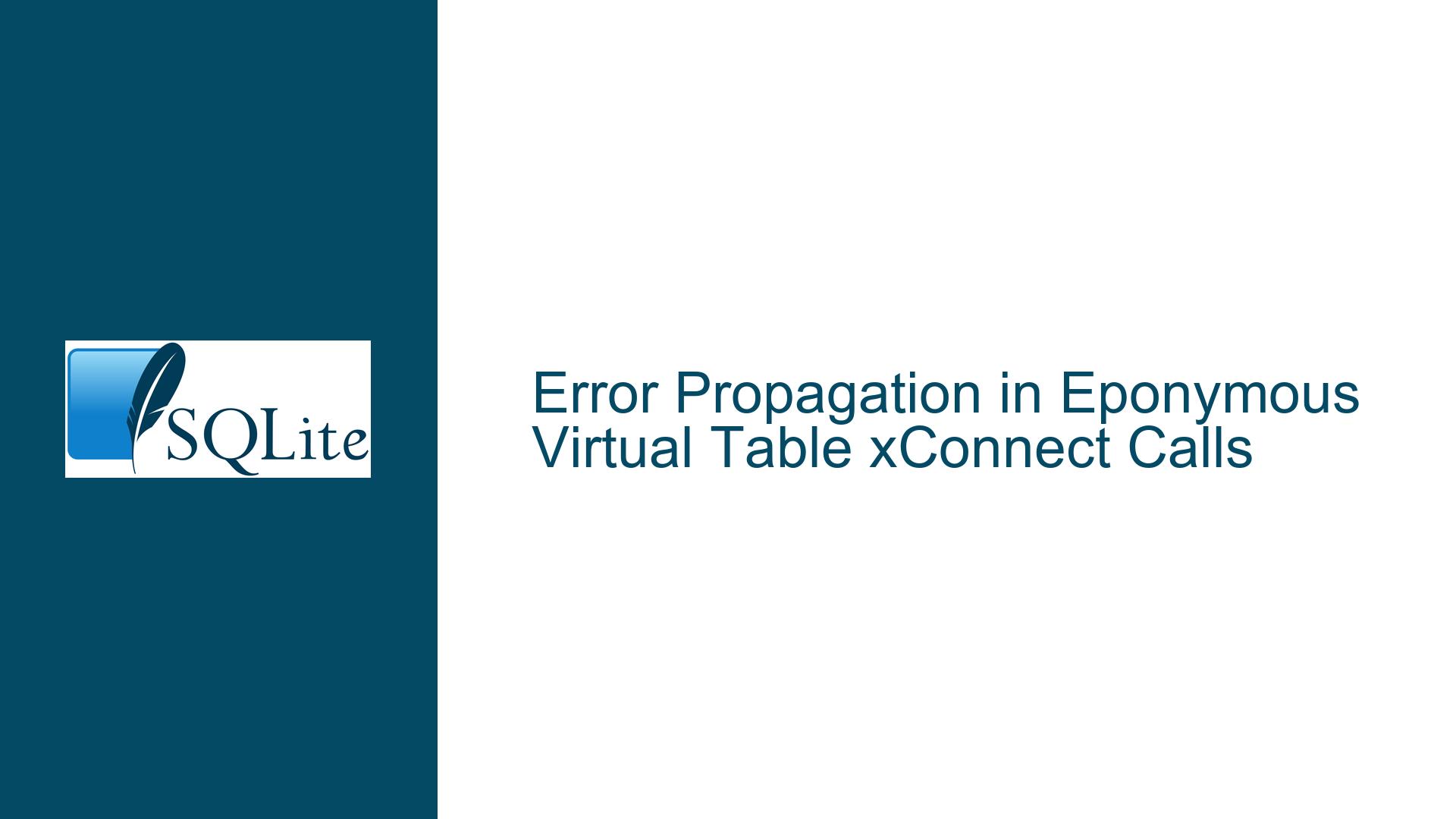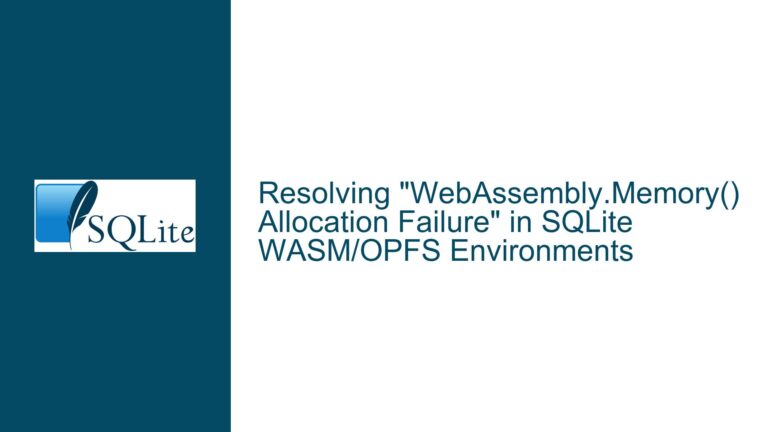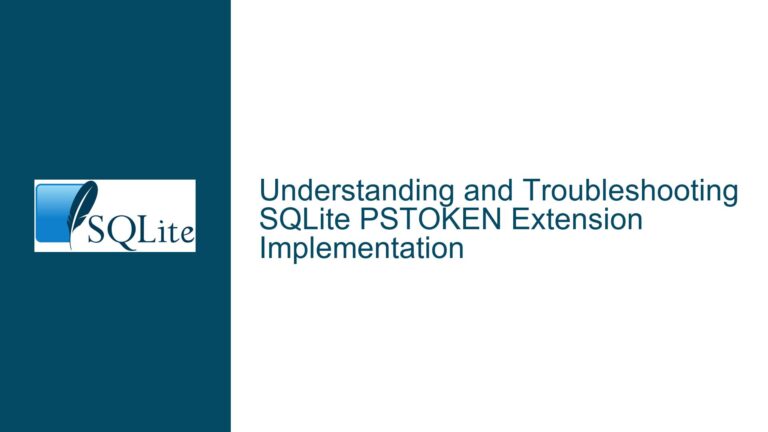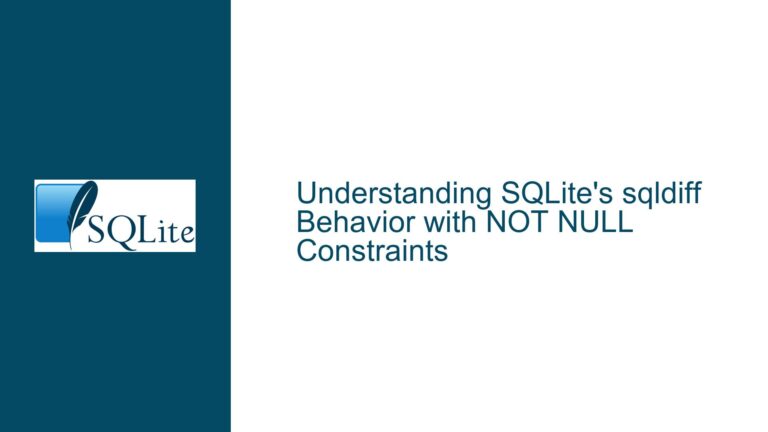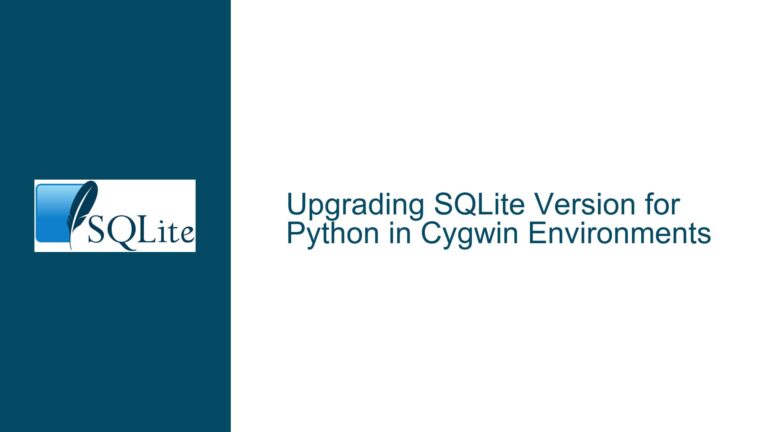Error Propagation in Eponymous Virtual Table xConnect Calls
Eponymous Virtual Table xConnect Error Handling Issue
When working with SQLite’s eponymous virtual tables, a critical issue arises in the error handling mechanism during the xConnect call. Specifically, the error message returned via the pzErr parameter in the xConnect function is not being propagated correctly to the caller. Instead, the caller receives a generic "no such table" error, even when the pzErr message is explicitly set to a non-null and non-empty value. This behavior is particularly problematic when the virtual table’s schema depends on data retrieved from the database itself, as errors need to be reported immediately rather than deferred to later stages like cursor handling.
The issue becomes more nuanced when considering the behavior of other SQLite functions like pragma_table_info. When pragma_table_info is called with an invalid database name, it correctly reports an "unknown database" error. This indicates that the eponymous virtual table mechanism is capable of reporting different types of errors, but this capability is not being leveraged in the xConnect call. The discrepancy suggests that the error handling logic in xConnect is either being overridden or ignored when the virtual table is accessed in its eponymous form.
To further complicate matters, the pragmaVtabFilter function, which is responsible for transforming table-valued data from pragma_table_info into a PRAGMA query, appears to handle errors differently. It directly returns the error from the PRAGMA query, bypassing the xConnect error reporting mechanism. This behavior was confirmed through a test where an unconditional error was introduced in the xConnect handler. When the virtual table was accessed directly via a unique name, the custom error message was correctly propagated. However, when accessed in its eponymous form, the generic "no such table" error was returned, even though the debugger confirmed that the custom error message was passed to SQLite.
Misalignment Between xConnect and Eponymous Table Error Reporting
The root cause of this issue lies in the misalignment between the error reporting mechanisms of the xConnect function and the eponymous virtual table implementation. The xConnect function is designed to handle errors by setting the pzErr parameter, which should propagate the error message back to the caller. However, when the virtual table is accessed in its eponymous form, this error reporting mechanism is either being bypassed or overridden by the SQLite engine.
One possible explanation for this behavior is that the SQLite engine treats eponymous virtual tables differently from regular virtual tables. Eponymous virtual tables do not require explicit creation via a CREATE VIRTUAL TABLE statement, and they are automatically available when the corresponding module is registered. This automatic availability might lead the SQLite engine to assume that the table exists, and thus, it defaults to a "no such table" error when something goes wrong during the xConnect call.
Another contributing factor could be the way the pragmaVtabFilter function processes errors. Since this function transforms the table-valued data into a PRAGMA query, it might be handling errors at a lower level, bypassing the xConnect error reporting mechanism. This would explain why the "unknown database" error is correctly reported by pragma_table_info, while the custom error message from xConnect is not propagated when the virtual table is accessed in its eponymous form.
Additionally, the issue might be exacerbated by the fact that eponymous virtual tables are often used in scenarios where the schema depends on the data found in the database. In such cases, errors need to be reported immediately, as any delay could lead to incorrect schema assumptions. However, the current implementation seems to delay error reporting until later stages, such as cursor handling, which is not feasible in these scenarios.
Implementing Custom Error Handling in Eponymous Virtual Tables
To address this issue, a custom error handling mechanism must be implemented in the xConnect function of eponymous virtual tables. This mechanism should ensure that error messages are propagated correctly to the caller, regardless of whether the virtual table is accessed directly or in its eponymous form. The following steps outline a potential solution:
First, the xConnect function should be modified to explicitly check for errors and set the pzErr parameter accordingly. This involves validating the input parameters, checking the database state, and ensuring that any errors encountered during the connection process are immediately reported. The pzErr message should be set to a descriptive error message that provides enough context for the caller to understand what went wrong.
Second, the SQLite engine should be configured to respect the pzErr message set by the xConnect function, even when the virtual table is accessed in its eponymous form. This might require modifications to the SQLite source code, particularly in the parts that handle eponymous virtual tables. The goal is to ensure that the error message set by xConnect is not overridden or ignored by the engine.
Third, the pragmaVtabFilter function should be updated to handle errors in a way that is consistent with the xConnect error reporting mechanism. This might involve adding additional checks to ensure that errors are propagated correctly, rather than being transformed or bypassed during the PRAGMA query process.
Finally, thorough testing should be conducted to ensure that the custom error handling mechanism works as expected. This includes testing the virtual table in both its direct and eponymous forms, as well as testing various error scenarios to ensure that the correct error messages are propagated to the caller. The debugger should be used to verify that the pzErr message is being set correctly and that it is not being overridden or ignored by the SQLite engine.
In conclusion, the issue of error propagation in eponymous virtual table xConnect calls is a complex one that requires a deep understanding of both the SQLite engine and the virtual table implementation. By implementing a custom error handling mechanism and ensuring that the SQLite engine respects the pzErr message set by xConnect, it is possible to resolve this issue and ensure that errors are reported correctly in all scenarios.
